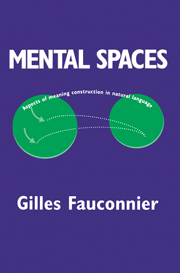Book contents
- Frontmatter
- Contents
- Foreword
- Preface
- Acknowledgments
- Introductory Note
- 1 Pragmatic Functions and Images
- 2 Roles and Multiple Connectors
- 3 Presuppositions: Floating, Transfer, and Projection Strategies
- 4 Counterfactuals and Comparatives
- Chapter 5 Transspatial Operators, Philosophical Issues, and Future Perspectives
- Notes
- References
- Index
Foreword
Published online by Cambridge University Press: 20 January 2010
- Frontmatter
- Contents
- Foreword
- Preface
- Acknowledgments
- Introductory Note
- 1 Pragmatic Functions and Images
- 2 Roles and Multiple Connectors
- 3 Presuppositions: Floating, Transfer, and Projection Strategies
- 4 Counterfactuals and Comparatives
- Chapter 5 Transspatial Operators, Philosophical Issues, and Future Perspectives
- Notes
- References
- Index
Summary
An Overview
This book is a major advance in the study of reference, descriptions, and coreference—topics that have long been at the center of research in linguistics and the philosophy of language. The more traditional theories assume that natural language semantics can be adequately studied with the tools of formal logic. Fauconnier has, however, recognized that the tools of formal logic fail when confronted with the full range of natural language phenomena. He has realized that what is needed instead is a cognitive theory—a theory that is based on the capacities of the human mind rather than the capacities of the mathematical systems that happen to be used by logicians.
Fauconnier posits a theory in which reference has a dimension of structure all its own, which is simply representable using mental spaces, connectors across the spaces, and a few general principles. The complexity lies largely in the interaction between the principles, and in the contextual structures that feed into the principles for interpretation. With such a simple structure, Fauconnier can handle examples that are beyond the capacities of complex logical theories. Here is a salient class of such examples.
The Split Self
There are sentences whose meaning requires splitting the self in two parts:
If I were you, I'd hate me.
If I were you, I'd hate myself.
These do not mean the same thing, and the problem is to represent both meanings. The first problem is: Me and myself refer back to two different people. But since they are both first person, they both should refer to the speaker.
Information
- Type
- Chapter
- Information
- Mental SpacesAspects of Meaning Construction in Natural Language, pp. ix - xviPublisher: Cambridge University PressPrint publication year: 1994
Accessibility standard: Unknown
Why this information is here
This section outlines the accessibility features of this content - including support for screen readers, full keyboard navigation and high-contrast display options. This may not be relevant for you.Accessibility Information
- 2
- Cited by
